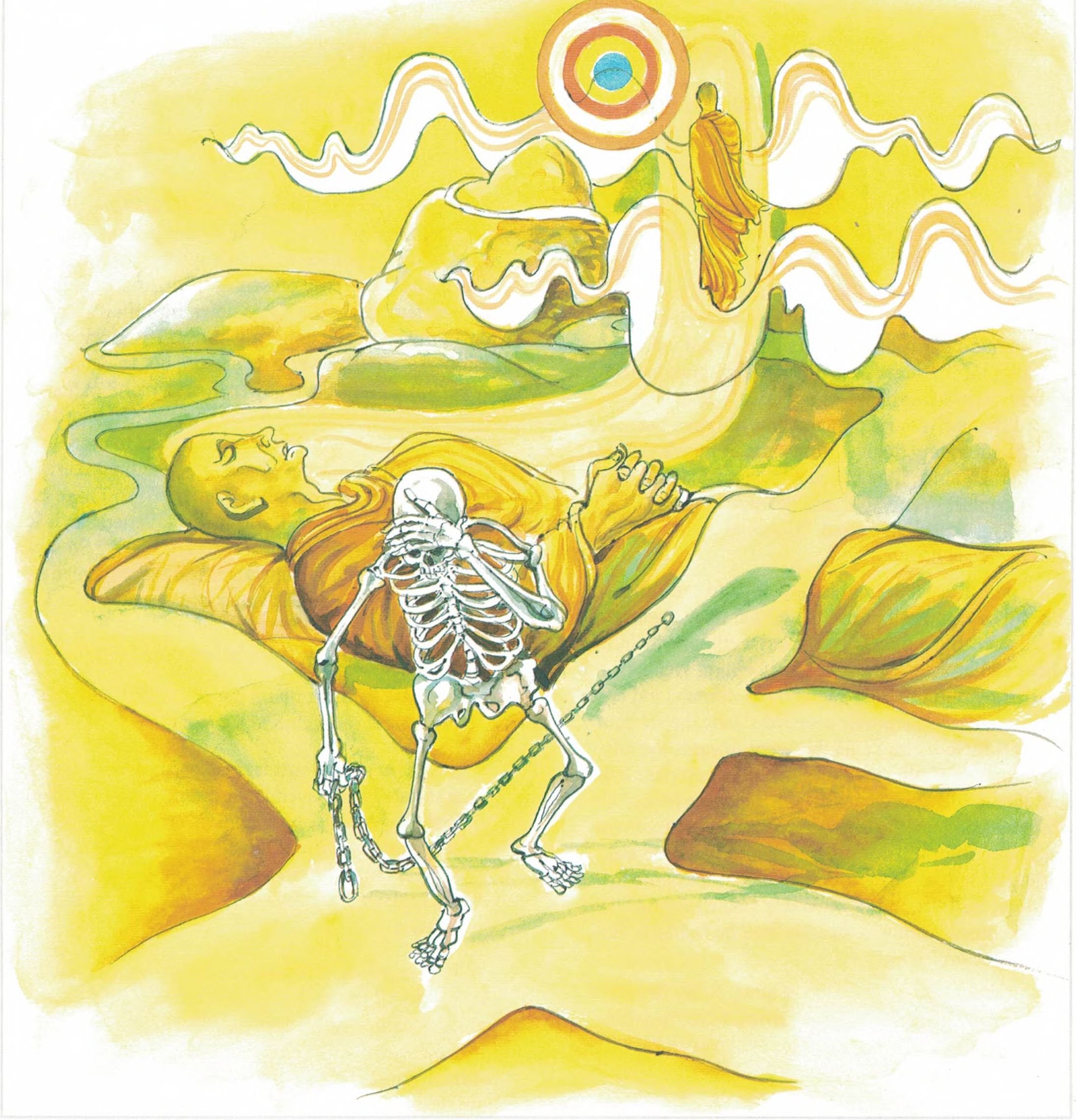Dhammapada (Illustrated)
by Ven. Weagoda Sarada Maha Thero | 1993 | 341,201 words | ISBN-10: 9810049382 | ISBN-13: 9789810049386
This page describes The Story of Venerable Godhika which is verse 57 of the English translation of the Dhammapada which forms a part of the Sutta Pitaka of the Buddhist canon of literature. Presenting the fundamental basics of the Buddhist way of life, the Dhammapada is a collection of 423 stanzas. This verse 57 is part of the Puppha Vagga (Flowers) and the moral of the story is “Of the diligent and the virtuous totally freed through wisdom, death never tracks the path”.
Verse 57 - The Story of Venerable Godhika
Pali text, illustration and English translation of Dhammapada verse 57:
tesaṃ sampannasīlānaṃ appamādavihārinaṃ |
sammadaññā vimuttānaṃ māro maggaṃ na vindati || 57 ||
57. Of those with perfect virtue who dwell in heedfulness, freed by Final Knowledge: Māra cannot know their path.
 Of the diligent and the virtuous totally freed through wisdom, death never tracks the path. |
The Story of Venerable Godhika
While residing at the Veluvana Monastery, the Buddha spoke this Verse, with reference to Venerable Godhika.
While Venerable Godhika was in residence at Black Rock on Mount Isigili, heedful, ardent, resolute, having attained ‘release of mind’ through the practice of meditation, he was attacked by a certain disease brought on by diligent application to duty, and fell away from the mental repose of ‘disknowing’. A second time and a third time, and unto six times, did he enter into a state of mental repose and fell away therefrom. As he entered into a state of mental repose for the seventh time, he thought to himself, “Six times I have fallen away from a state of mental repose. Doubtful is the future state of him who falls away from a state of mental repose. Now is the time for me to use the razor.”
Accordingly, he took the razor with which he shaved his hair, and lay down on his bed, intending to end his life. Māra perceived his intention and thought to himself, “This monk intends to use the razor. Those who use the razor in this way are indifferent to life. Such men, having attained penetration, win Arahatship. But if I try to prevent him from carrying out his intention, he will pay no attention to my words. I will therefore induce the Buddha to prevent him.” At that moment the Venerable drew his knife. The Buddha, perceiving Māra, said, “Thus do those who are steadfast, nor do they yearn for life. Godhika has uprooted craving and has attained Nibbāna.” Now the Buddha, accompanied by a large number of monks, entered the place where the Venerable had lain down and used his knife. At that moment Māra, the Evil One, like a pillar of smoke or a mass of darkness, was searching in all directions for the Venerable’s consciousness. Thought he, “Where has his rebirth-consciousness fixed itself?” The Buddha pointed out to the monks the pillar of smoke and the mass of darkness and said to them, “Monks, that is Māra, the Evil One, searching for the consciousness of the goodly youth Godhika. Thinks he, ‘Where has the consciousness of the goodly youth Godhika fixed itself?’ But, monks, the consciousness of the goodly youth Godhika has not fixed itself. For, monks, the goodly youth Godhika has passed into Nibbāna. Māra, being unable to find the place where the consciousness of the Venerable had fixed itself, approached the Buddha and asked him, “Where has Godhika gone?”
Said the Buddha to Māra, “Godhika has uprooted craving and has attained Nibbāna.” Then said the Buddha, “Evil One, what have you to do with the place where the consciousness of the goodly youth Godhika has fixed itself? A hundred or a thousand like you could never find it.”
Explanatory Translation (Verse 57)
sampannasīlānaṃ appamādavihārinaṃ sammadaññā
vimuttānaṃ tesaṃ maggaṃ māro na vindati
sampannasīlānaṃ [sampannasīlāna]: perfect in behaviour; appamādavihārinaṃ [appamādavihārina]: living alert; sammadaññā: fully knowing; vimuttānaṃ [vimuttāna]: freed of blemishes; tesaṃ [tesa]: (of) those noble ones; maggaṃ [magga]: traces, the path they took; Māro: the evil one (the Devil); na vindati: (does not) discover or find
Of those noble ones, who are perfect in behaviour, living constantly alert, fully aware of the experience within, Māra, the evil one, does not know their destiny. Māra can trace only the slothful dead. He cannot trace those who have reached the Deathless.
Commentary and exegetical material (Verse 53)
sammadaññāvimuttānaṃ: having achieved release through ‘disknowing’. This refers to one who gains ‘release’ (vimutti) by becoming fully aware of the experience within. Such a person attains release through a fivefold release. They are: Release through Elimination; Release through the Cultivation of Opposites; Release through Cutting Off; Release through Subsidence and Release through Moving Away.
aññā: really means ‘disknowing’. Though it is commonly translated as knowledge, it is not the grasping of concepts. It is the freedom from concepts. It is the cessation of object vision and involvement with objects of knowledge. It is awareness of the process of knowing rather than of the object known which leads to craving. It is mental repose. This is called the ‘cessation of cognition’ (viññassa nirodha). It is also called ‘unmanifest cognition’ (anidassana viññāna). All object knowledge range falls within the ken of Māra. This freedom from object knowledge, Māra does not know.
Māro: There are five concepts of ‘Māra’ in Buddhism:
- Death itself (maccu māra);
- The five aggregates (khanda māra);
- Defilements (kilesa māra);
- Mental constructs (sankhāra māra);
- A deity called Māra who always tries to obstruct spiritual progress in the world (devaputta māra).
In this particular verse and story, the term Māra stands for this evil entity called Māra.
